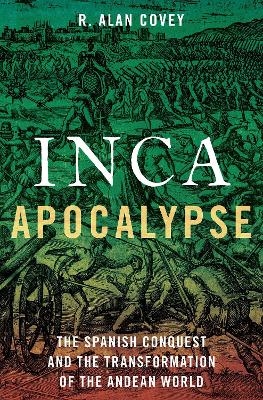
Inca Apocalypse
The Spanish Conquest and the Transformation of the Andean World
Seiten
2020
Oxford University Press Inc (Verlag)
978-0-19-029912-5 (ISBN)
Oxford University Press Inc (Verlag)
978-0-19-029912-5 (ISBN)
This is a major new history of the Spanish conquest of the Inca empire, set in a larger global context than previous accounts, made possible by new archaeological and archival research. Although based on solid scholarly foundations, Inca Apocalypse will be accessible to non-academic readers.
Inca Apocalypse develops a new perspective on the European invasions of the Inca realm, and the way that the Spanish transformation of the Andes relates to broader changes occurring in the transition from medieval to early modern Europe. The book is structured to foreground some of the parallels in the imperial origins of the Incas and Spain, as well as some of the global processes affecting both societies during the first century of their interaction. The Spanish conquest of the Inca empire was more than a decisive victory at Cajamarca in 1532-it was an uneven process that failed to bring to pass the millenarian vision that set it in motion, yet it succeeded profoundly in some respects. The Incas and their Andean subjects were not passive victims of colonization, and indigenous complicity and resistance actively shaped Spanish colonial rule.
As it describes the transformation of the Inca world, Inca Apocalypse attempts to build a more global context than previous accounts of the Spanish Conquest, and it seeks not to lose sight of the parallel changes occurring in Europe as Spain pursued state projects that complemented the colonial endeavors in the Americas. New archaeological and archival research makes it possible to frame a familiar story from a larger historical and geographical scale than has typically been considered. The new text will have solid scholarly foundations but a narrative intended to be accessible to non-academic readers.
Inca Apocalypse develops a new perspective on the European invasions of the Inca realm, and the way that the Spanish transformation of the Andes relates to broader changes occurring in the transition from medieval to early modern Europe. The book is structured to foreground some of the parallels in the imperial origins of the Incas and Spain, as well as some of the global processes affecting both societies during the first century of their interaction. The Spanish conquest of the Inca empire was more than a decisive victory at Cajamarca in 1532-it was an uneven process that failed to bring to pass the millenarian vision that set it in motion, yet it succeeded profoundly in some respects. The Incas and their Andean subjects were not passive victims of colonization, and indigenous complicity and resistance actively shaped Spanish colonial rule.
As it describes the transformation of the Inca world, Inca Apocalypse attempts to build a more global context than previous accounts of the Spanish Conquest, and it seeks not to lose sight of the parallel changes occurring in Europe as Spain pursued state projects that complemented the colonial endeavors in the Americas. New archaeological and archival research makes it possible to frame a familiar story from a larger historical and geographical scale than has typically been considered. The new text will have solid scholarly foundations but a narrative intended to be accessible to non-academic readers.
R. Alan Covey is a professor of anthropology at the University of Texas at Austin, and a research associate at the American Museum of Natural History.
Preface
Chapter 1: Assembling Inca History
Chapter 2: Making Iberian History before the Invention of Spain
Chapter 3: Royal Progress
Chapter 4: Uncertain Empires
Chapter 5: Two Roads to Cajamarca
Chapter 6: Beyond Cajamarca
Chapter 7: Sovereign Failures and New Miracles
Chapter 8: Conquering the Conquistadors and Poor Soldiers
Chapter 9. Conquering Andean Hearts and Minds
Chapter 10. Advent of the Spanish Pachacuti
Chapter 11. Overturning Andean Landscapes
Chapter 12. Transcendent Inca
References
| Erscheinungsdatum | 09.07.2020 |
|---|---|
| Zusatzinfo | 25 halftones, 5 maps |
| Verlagsort | New York |
| Sprache | englisch |
| Maße | 236 x 155 mm |
| Gewicht | 975 g |
| Themenwelt | Geisteswissenschaften ► Archäologie |
| Geschichte ► Allgemeine Geschichte ► Vor- und Frühgeschichte | |
| Geisteswissenschaften ► Geschichte ► Regional- / Ländergeschichte | |
| ISBN-10 | 0-19-029912-6 / 0190299126 |
| ISBN-13 | 978-0-19-029912-5 / 9780190299125 |
| Zustand | Neuware |
| Informationen gemäß Produktsicherheitsverordnung (GPSR) | |
| Haben Sie eine Frage zum Produkt? |
Mehr entdecken
aus dem Bereich
aus dem Bereich
Konzepte – Methoden – Theorien
Buch | Softcover (2024)
UTB (Verlag)
39,90 €
Was Pompeji über uns erzählt
Buch | Hardcover (2023)
Propyläen (Verlag)
32,00 €
auf den Spuren der frühen Zivilisationen
Buch | Hardcover (2023)
C.H.Beck (Verlag)
20,00 €


